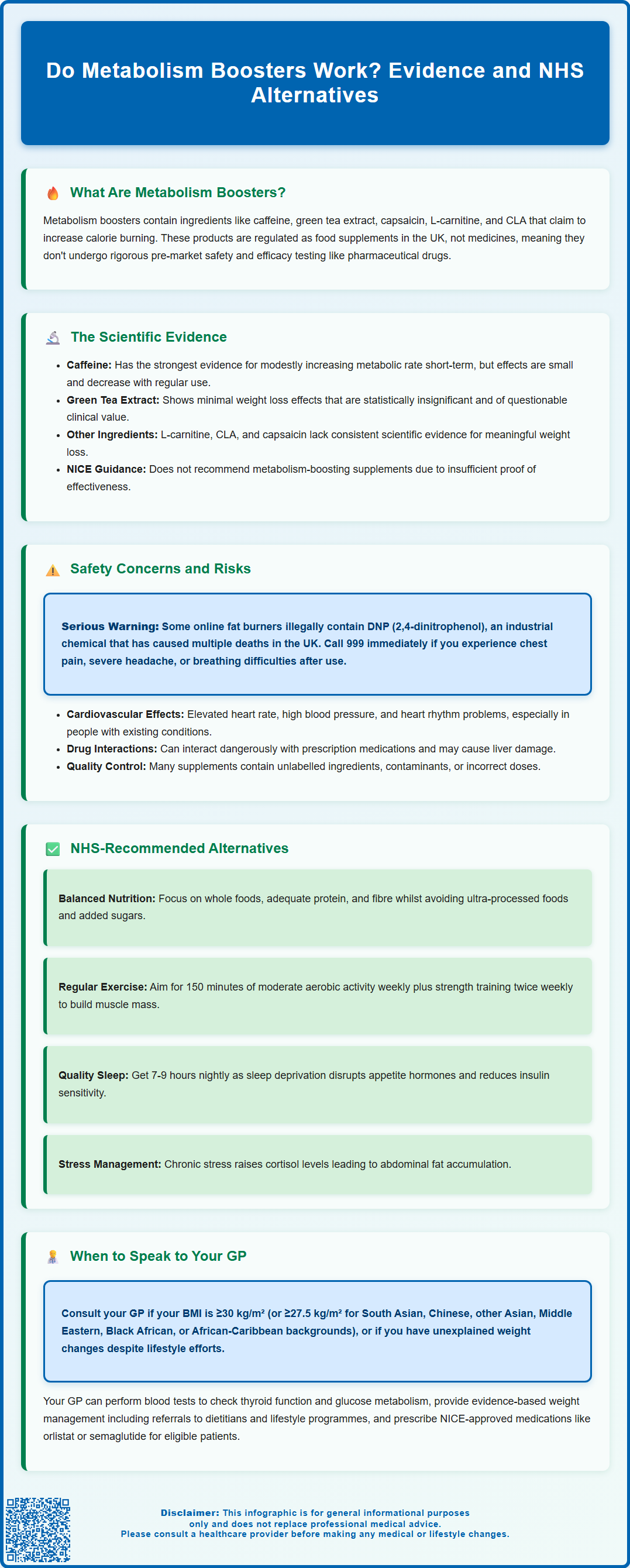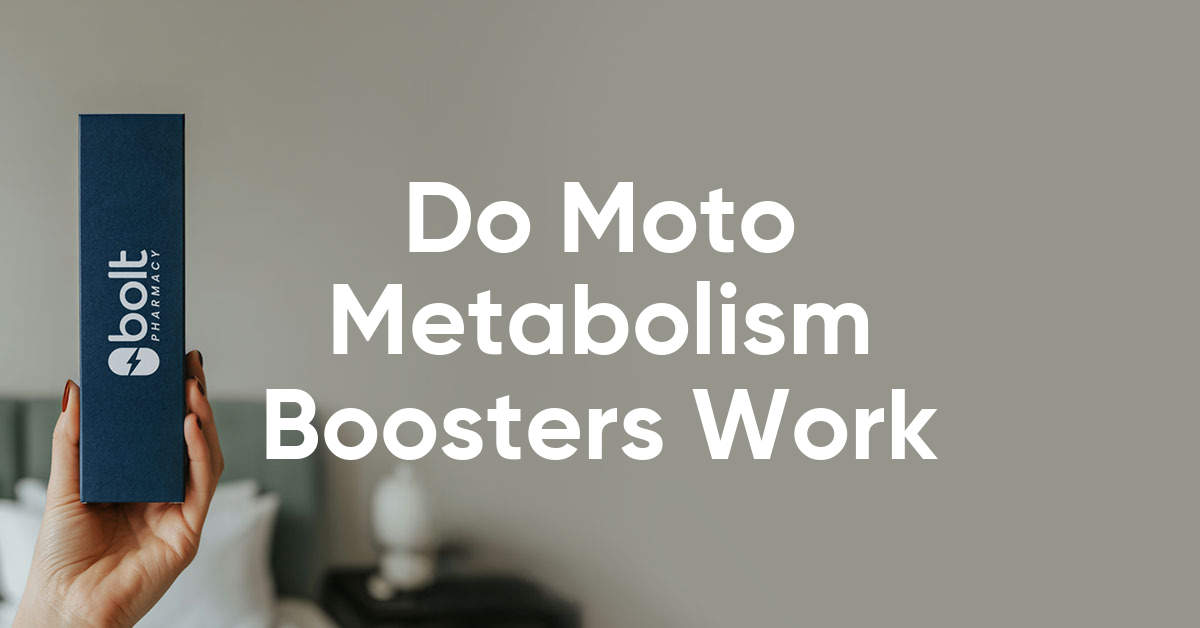Metabolism boosters are widely marketed dietary supplements claiming to accelerate calorie burning and support weight loss through ingredients such as caffeine, green tea extract, and capsaicin. Whilst these products are readily available online and in health shops, their effectiveness and safety remain subjects of considerable debate. Unlike prescription medicines, metabolism boosters are regulated as food supplements in the UK, meaning they do not undergo the rigorous pre-market testing required for licensed medications. This article examines the scientific evidence behind metabolism-boosting claims, explores potential safety concerns, and outlines NHS-recommended alternatives for supporting healthy metabolism and sustainable weight management.
Summary: Metabolism boosters show limited and inconsistent scientific evidence for effectiveness, with most ingredients producing only modest, short-term effects that are not clinically significant for sustained weight loss.
- Metabolism boosters are regulated as food supplements in the UK, not medicines, and lack rigorous pre-market efficacy and safety testing required for licensed medications.
- Caffeine has the most robust evidence for temporarily increasing metabolic rate, though effects are small, vary individually, and diminish with regular use.
- Stimulant-containing products can cause cardiovascular side effects including elevated heart rate, increased blood pressure, palpitations, and arrhythmias, particularly in vulnerable populations.
- NICE does not recommend metabolism-boosting supplements in evidence-based weight management guidance due to insufficient evidence for clinical effectiveness.
- NHS-recommended alternatives include balanced nutrition, regular physical activity (150 minutes weekly plus strength training), adequate sleep, and structured weight management programmes with proven efficacy.
Table of Contents
- What Are Metabolism Boosters and How Do They Claim to Work?
- Scientific Evidence: Do Metabolism Boosters Actually Work?
- Safety Concerns and Side Effects of Metabolism-Boosting Products
- NHS-Recommended Alternatives for Supporting Healthy Metabolism
- When to Speak to Your GP About Weight Management
- Frequently Asked Questions
What Are Metabolism Boosters and How Do They Claim to Work?
Metabolism boosters, often marketed as dietary supplements or herbal products, claim to increase the body's metabolic rate—the speed at which calories are burned at rest and during activity. These products typically contain combinations of ingredients such as caffeine, green tea extract, capsaicin (from chilli peppers), L-carnitine, conjugated linoleic acid (CLA), and various herbal compounds like guarana or bitter orange (synephrine).
Manufacturers suggest these substances work through several proposed mechanisms. Caffeine and similar stimulants may temporarily increase thermogenesis (heat production in the body), potentially raising energy expenditure. Green tea catechins, particularly epigallocatechin gallate (EGCG), are claimed to enhance fat oxidation through effects on noradrenaline activity. Capsaicin is suggested to increase energy expenditure, though the magnitude of this effect in humans appears modest.
Other ingredients like L-carnitine are marketed as facilitating fat transport into mitochondria for energy production, whilst CLA is promoted as potentially influencing lipid metabolism. Many products combine multiple ingredients with claims of enhanced effects, though evidence for such synergy in humans is limited.
It is important to understand that metabolism boosters are regulated as food supplements in the UK, not medicines. This means they fall under food law (enforced by the Food Standards Agency and Trading Standards), with advertising claims governed by the Advertising Standards Authority. Unlike medicines regulated by the Medicines and Healthcare products Regulatory Agency (MHRA), supplements are not subject to the same rigorous pre-market testing for efficacy and safety. The MHRA does take action when products make medicinal claims or contain unlicensed medicinal ingredients.
Some online 'fat burners' have been found to contain prescription-only or banned substances. Particularly concerning is 2,4-dinitrophenol (DNP), which is not a legitimate supplement but an industrial chemical illegally marketed for weight loss that has caused numerous fatalities in the UK.
Scientific Evidence: Do Metabolism Boosters Actually Work?
The scientific evidence supporting metabolism boosters is limited and often inconsistent. Systematic reviews and meta-analyses have examined individual ingredients with mixed results. Caffeine has the most robust evidence base: studies demonstrate it can modestly increase metabolic rate in the short term, though effects vary by individual, dose, and tolerance development. These effects are typically small and may diminish with regular use.
Green tea extract has shown some promise in research, with meta-analyses suggesting modest effects on weight. A Cochrane Review concluded that green tea preparations led to small, statistically non-significant weight loss in overweight or obese adults, and the clinical significance of these changes is questionable. The proposed mechanisms involve catechin-caffeine interactions, but the magnitude of metabolic enhancement remains modest.
Evidence for other popular ingredients is considerably weaker. L-carnitine supplementation has not demonstrated consistent benefits for weight loss or metabolic enhancement in individuals with normal carnitine levels. Similarly, CLA has produced inconsistent results, with some studies showing minimal fat loss and others showing no significant effect compared to placebo. Capsaicin may produce small increases in energy expenditure, but practical effects on weight management appear negligible.
Crucially, most studies showing positive effects are short-term, industry-funded, or conducted in controlled laboratory settings that may not reflect real-world conditions. Long-term randomised controlled trials demonstrating clinically meaningful and sustained weight loss from metabolism boosters are lacking. The National Institute for Health and Care Excellence (NICE) does not recommend metabolism-boosting supplements as part of evidence-based weight management strategies in its obesity guidance (CG189), reflecting the insufficient evidence base for their effectiveness.

Safety Concerns and Side Effects of Metabolism-Boosting Products
Metabolism boosters are not without risks, and several safety concerns warrant careful consideration. Stimulant-containing products (caffeine, guarana, bitter orange) can cause adverse cardiovascular effects including elevated heart rate, increased blood pressure, palpitations, and arrhythmias. Individuals with pre-existing cardiovascular conditions, hypertension, or anxiety disorders face heightened risks. Excessive caffeine intake can also cause insomnia, nervousness, gastrointestinal disturbance, and headaches. For most adults, caffeine intake should not exceed 400mg daily (roughly 4 cups of coffee), and pregnant women should limit intake to 200mg daily.
Bitter orange (synephrine) has raised particular safety concerns due to its structural similarity to ephedrine, which was banned in many countries following associations with serious cardiovascular events. Case reports have linked synephrine-containing products to adverse cardiovascular events, though causality remains difficult to establish definitively.
Herbal ingredients in metabolism boosters may interact with prescription medications. Green tea products may reduce the anticoagulant effect of warfarin; patients taking warfarin should consult their healthcare provider before using such supplements and have their INR monitored. Stimulants may interact with antidepressants, particularly monoamine oxidase inhibitors (MAOIs). Hepatotoxicity (liver damage) has been reported with certain weight-loss supplements, including some containing high doses of green tea extract. Warning signs include yellowing of the skin/eyes (jaundice), dark urine, pale stools, severe abdominal pain or itching—if these occur, stop taking the product and seek urgent medical advice.
A significant concern is the variable quality control in the supplements market. Products may contain undeclared ingredients, contaminants, or quantities of active substances that differ from label claims. The MHRA regularly issues warnings about specific products found to contain unlicensed medicines or harmful substances. Particularly dangerous is 2,4-dinitrophenol (DNP), an industrial chemical illegally sold as a 'fat burner' that has caused multiple deaths in the UK.
Vulnerable populations—including pregnant or breastfeeding women, children, individuals with chronic health conditions, and those taking multiple medications—should avoid metabolism boosters entirely. Anyone experiencing chest pain, severe headache, difficulty breathing, or other concerning symptoms after using these products should seek immediate medical attention (call 999 for severe chest pain, stroke symptoms, severe breathlessness or collapse). Suspected adverse reactions can be reported through the MHRA Yellow Card scheme.
NHS-Recommended Alternatives for Supporting Healthy Metabolism
The NHS advocates evidence-based lifestyle modifications as the foundation for healthy metabolism and sustainable weight management, rather than reliance on supplements. Dietary approaches emphasise balanced nutrition with appropriate caloric intake, focusing on whole foods, adequate protein, fibre-rich vegetables and fruits, and minimising ultra-processed foods and added sugars. Crash dieting or severe caloric restriction can actually reduce metabolic rate, making gradual, sustainable changes preferable.
Regular physical activity is crucial for metabolic health. The UK Chief Medical Officers recommend at least 150 minutes of moderate-intensity aerobic activity weekly, combined with strength training exercises on two or more days. Resistance training is particularly valuable as it builds lean muscle mass, which increases resting metabolic rate. Even modest increases in daily movement—taking stairs, walking during breaks, reducing sedentary time—contribute meaningfully to energy expenditure.
Adequate sleep (7–9 hours nightly for most adults) is essential for metabolic regulation. Sleep deprivation disrupts hormones controlling appetite (leptin and ghrelin) and can reduce insulin sensitivity, promoting weight gain. Similarly, stress management is important, as chronic stress elevates cortisol levels, which can promote abdominal fat accumulation and metabolic dysfunction.
Hydration supports metabolic processes, with water being the healthiest choice. Replacing sugary beverages with water reduces caloric intake substantially and supports overall health.
For individuals requiring additional support, the NHS offers structured weight management programmes, often delivered through GP surgeries or local services. NICE-approved interventions include behavioural therapy, commercial weight management programmes meeting quality standards, and in appropriate cases, pharmacological treatments. These include orlistat (for BMI ≥30, or ≥28 with risk factors) and, in specialist services, semaglutide (Wegovy) for adults with a BMI of at least 35 (or 30 with weight-related health problems) and at least one weight-related comorbidity, as per NICE TA875. For severe obesity, bariatric surgery referral may be considered. These evidence-based approaches have demonstrated effectiveness far exceeding that of metabolism-boosting supplements, with proper medical supervision ensuring safety.
When to Speak to Your GP About Weight Management
Consulting your GP is advisable if you are struggling with weight management despite implementing lifestyle changes, or if you have concerns about your metabolic health. Specific triggers for GP consultation include:
-
Body Mass Index (BMI) ≥30 kg/m², or ≥27.5 kg/m² for individuals of South Asian, Chinese, other Asian, Middle Eastern, Black African, or African-Caribbean family background
-
Unexplained weight gain or difficulty losing weight despite sustained efforts with diet and exercise
-
Unexplained weight loss without trying to lose weight (which requires prompt medical assessment)
-
Symptoms suggesting metabolic or endocrine disorders: extreme fatigue, cold intolerance, constipation, dry skin (hypothyroidism); excessive thirst and urination (diabetes); irregular menstrual periods with weight gain (polycystic ovary syndrome)
-
Weight-related health complications: hypertension, type 2 diabetes, dyslipidaemia, sleep apnoea, or joint problems
-
Considering or currently using metabolism boosters or weight-loss supplements, particularly if experiencing side effects
-
Eating disorders or disordered eating patterns affecting your relationship with food and body image
Your GP can conduct appropriate investigations, including blood tests to assess thyroid function (TSH, free T4), glucose metabolism (HbA1c, fasting glucose), and lipid profiles. They can identify underlying medical conditions affecting metabolism and review medications that may contribute to weight gain (certain antidepressants, antipsychotics, corticosteroids, or diabetes medications).
GPs can provide evidence-based weight management support, including referral to dietitians, structured lifestyle programmes, psychological services for eating disorders, or specialist weight management clinics. For eligible patients, prescription medications (orlistat for BMI ≥30 or ≥28 with risk factors) or referral to specialist services for consideration of semaglutide or bariatric surgery (typically BMI ≥40, or ≥35 with significant comorbidities) may be appropriate options.
When consulting your GP, bring details of any supplements you're taking, including product packaging if possible, to help assess potential interactions with medications. Early consultation enables timely intervention, preventing progression of weight-related health complications and supporting long-term metabolic health through safe, effective strategies.
Frequently Asked Questions
Are metabolism boosters safe to use?
Metabolism boosters carry safety risks including cardiovascular side effects from stimulants, potential drug interactions, and variable quality control with some products containing undeclared or harmful substances. Vulnerable populations including pregnant women, those with cardiovascular conditions, and individuals taking multiple medications should avoid these products entirely.
What does the NHS recommend instead of metabolism boosters?
The NHS recommends evidence-based lifestyle modifications including balanced nutrition, at least 150 minutes of moderate-intensity physical activity weekly with strength training, adequate sleep (7–9 hours nightly), stress management, and structured weight management programmes. For eligible patients, prescription medications like orlistat or specialist referral may be appropriate.
When should I see my GP about weight management?
Consult your GP if you have a BMI ≥30 kg/m² (or ≥27.5 kg/m² for certain ethnic backgrounds), experience unexplained weight changes, have symptoms suggesting metabolic disorders, develop weight-related health complications, or are considering metabolism-boosting supplements. Your GP can conduct appropriate investigations and provide evidence-based support.
The health-related content published on this site is based on credible scientific sources and is periodically reviewed to ensure accuracy and relevance. Although we aim to reflect the most current medical knowledge, the material is meant for general education and awareness only.
The information on this site is not a substitute for professional medical advice. For any health concerns, please speak with a qualified medical professional. By using this information, you acknowledge responsibility for any decisions made and understand we are not liable for any consequences that may result.
Heading 1
Heading 2
Heading 3
Heading 4
Heading 5
Heading 6
Lorem ipsum dolor sit amet, consectetur adipiscing elit, sed do eiusmod tempor incididunt ut labore et dolore magna aliqua. Ut enim ad minim veniam, quis nostrud exercitation ullamco laboris nisi ut aliquip ex ea commodo consequat. Duis aute irure dolor in reprehenderit in voluptate velit esse cillum dolore eu fugiat nulla pariatur.
Block quote
Ordered list
- Item 1
- Item 2
- Item 3
Unordered list
- Item A
- Item B
- Item C
Bold text
Emphasis
Superscript
Subscript












